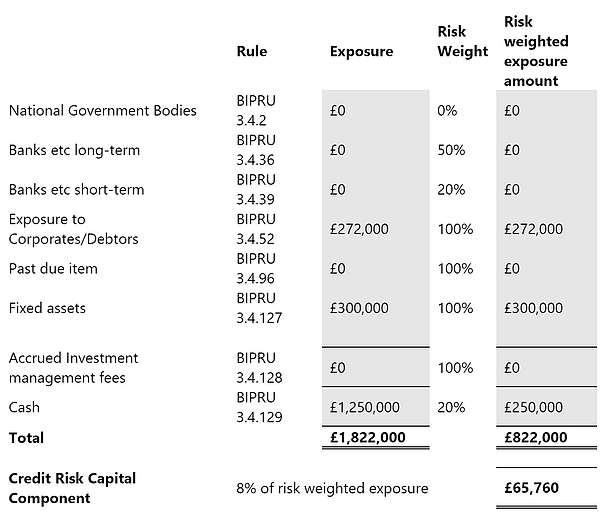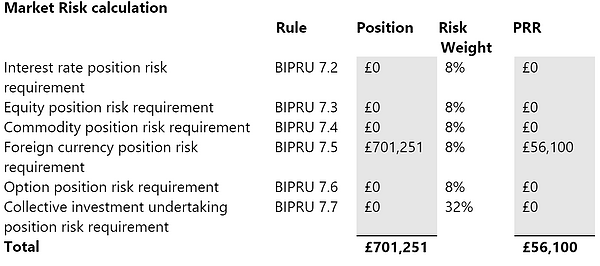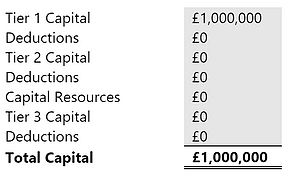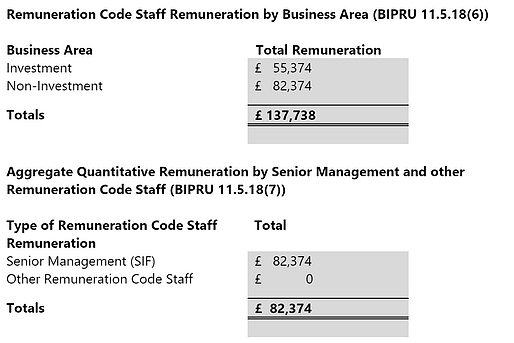Regulatory Disclosures
PILLAR 3 DISCLOSURE
Introduction
Regulatory Context
The Pillar 3 disclosure of FIFTHDELTA Limited (“the Firm”) is set out below as required by the FCA’s “Prudential Sourcebook for Banks, Building Societies and Investment Firms” (BIPRU) specifically BIPRU 11.3.3 R. This is a requirement which stems from the UK’s CRDIII implementing Regulations which represented the European Union’s application of the Basel Capital Accord. The Firm is no longer formally subject to CRD but remain subject to the UK’s implementation Regulations of CRD prior to CRDIV. The regulatory aim of the disclosures is to improve market discipline.
Frequency
The Firm makes its Pillar 3 disclosures at least annually. The disclosures will be as at the Firm’s Accounting Reference Date (“ARD”).
Media and Location
The disclosure will be published on our website.
Verification
The information contained in this document has not been audited by the Firm’s external auditors, as this is not a requirement, and does not constitute any form of financial statement and must not be relied upon in making any judgement on the Firm.
Materiality
The Firm regards information as material in disclosures if its omission or misstatement could change or influence the assessment or decision of a user relying on that information for the purpose of making economic decisions. If the Firm deems a certain disclosure to be immaterial, it may be omitted from this Statement.
Confidentiality
The Firm regards information as proprietary if sharing that information with the public would undermine its competitive position. Proprietary information may include information on products or systems which, if shared with competitors, would render the Firm’s investments therein less valuable. Further, the Firm must regard information as confidential if there are obligations to customers or other counterparty relationships binding the Firm to confidentiality. In the event that any such information is omitted, we shall disclose such and explain the grounds why it has not been disclosed.
Summary
The CRD, to which the Firm remains subject as a consequence of the UK CRDIII implementing Regulations, has three pillars; Pillar 1 deals with minimum capital requirements; Pillar 2 deals with Internal Capital Adequacy Assessment Process (“ICAAP”) undertaken by a firm and the Supervisory Review and Evaluation Process through which the Firm and Regulator satisfy themselves on the adequacy of capital held by the Firm in relation to the risks it faces and; Pillar 3 which deals with public disclosure of risk management policies, capital resources and capital requirements.
The Firm is a Collective Portfolio Management Investment (“CPMI”) Firm. It acts solely as agent, so the main protection to our customers is provided through client money and asset arrangements. The Firm’s greatest risks have been identified as business and operational risk. The Firm is required to disclose its risk management objectives and policies for each separate category of risk which include the strategies and processes to manage those risks; the structure and organisation of the relevant risk management function or other appropriate arrangement; the scope and nature of risk reporting and measurement systems; and the policies for hedging and mitigating risk, and the strategies and processes for monitoring the continuing effectiveness of hedges and mitigants.
The Firm has assessed business and operational risks in its ICAAP and set out appropriate actions to manage them.
A number of key operations are outsourced by our clients, typically the Funds we provide Investment Management services to, to third party providers such as administrators reducing our exposure to operational risk. The Firm has an operational risk framework (described below) in place to mitigate operational risk. The Firm’s main exposure to credit risk is the risk that management and performance fees cannot be collected and, therefore, credit risk is considered low. The Firm holds all cash and performance fee balances with banks assigned high credit ratings.
Market Risk exposure has been assessed by the Firm and is limited to the Firm’s exposure to foreign currency exchange rate risk and hence to any assets held on the Firm’s Balance Sheet denominated in a foreign currency. The Firms Reporting Currency is GBP and all foreign currency assets are converted into GBP where possible on a regular basis.
Background to the Firm
Background
The Firm is incorporated in the UK and is authorised and regulated by the FCA as a CPMI Firm. The Firm’s activities give it the prudential categorisation of a ‘BIPRU Firm’.
The Firm is the only entity covered by the ICAAP.
The Firm is a Solo regulated entity.
The Firm is a BIPRU Firm without an Investment Firm Consolidation Waiver deducting Material Holdings under (GENPRU 2 Annex 4).
BIPRU 11.5.1
Disclosure: Risk Management Objectives and Policies
Risk Management Objective
The Firm has a risk management objective to develop systems and controls to mitigate risk to within its risk appetite.
Governance Framework
The Governing Body of the Firm and has the daily management and oversight responsibility. It meets quarterly and is composed of:
- Caroline Bradley
- Tio Chaharbaghi
- Niall O’Keeffe
- Fahmi Syed
The Governing Body is responsible for the entire process of risk management, as well as forming its own opinion on the effectiveness of the process. In addition, the Governing Body decides the Firm’s risk appetite or tolerance for risk and ensures that the Firm has implemented an effective, ongoing process to identify risks, to measure its potential impact and then to ensure that such risks are actively managed. Senior Management is accountable to the Governing Body for designing, implementing and monitoring the process of risk management and implementing it into the day-to-day business activities of the Firm.
Risk Framework
Risk within the Firm is managed via the ICAAP.
BIPRU 11.5.4
Disclosure: Compliance with BIPRU 3, BIPRU 4, BIPRU 7 and the Overall Pillar 2 Rule
BIPRU 3 (Credit Risk)
For its Pillar 1 regulatory capital calculation of Credit Risk, under the credit risk capital component the Firm has adopted the Standardised approach (BIPRU 3.4) and the Simplified method of calculating risk weights (BIPRU 3.5).

BIPRU 4 (Advanced Credit Risk Approach)
The Firm does not adopt the Internal Ratings Based approach and hence this is not applicable.
BIPRU 7 (Market Risk)
The Firm has Non-Trading Book potential exposure only (BIPRU 7.4, 7.5).
Overall Pillar 2 Rule
The Firm has adopted the “Structured” approach to the calculation of its ICAAP Capital Resources Requirement as outlined in the Committee of European Banking Supervisors Paper, 25 January 2006.
The ICAAP assessment is reviewed by the Governing Body and amended where necessary, periodically (and at least annually) or when a material change to the business occurs. The ICAAP document is presented to the Governing Body of the Firm which reviews and endorses the risk management objective each quarter or when a material change to the business occurs at the same time as reviewing and signing off the ICAAP document.
BIPRU 11.5.8
Disclosure: Credit Risk and Dilution Risk
The Firm is primarily exposed to Credit Risk from the risk of non-collection of management fees. It holds all cash and performance fee balances with Banks assigned high credit ratings. Consequently, risk of past due or impaired exposures is minimal. A financial asset is past due when a counterparty has failed to make a payment when contractually due. Impairment is defined as a reduction in the recoverable amount of a fixed asset or goodwill below its carrying amount.
BIPRU 11.5.12
Disclosure: Market Risk

BIPRU 11.5.2
Disclosure: Scope of application of directive requirements
The Firm is subject to the disclosures under the UK CRDIII Implementing Regulations.
However, it is not a member of a UK Consolidation Group and consequently, does not report on a consolidated basis for accounting and prudential purposes.
BIPRU 11.5.3
Disclosure: Capital Resources
The Firm is a [BIPRU Investment Firm without an Investment Firm Consolidation Waiver deducting Material Holdings under (GENPRU 2 Annex 4). Tier 1 Capital may comprise of Shares/Share Premium Accounts/Subordinated Debt/Innovative Tier One Capital and Audited Reserves/Losses

BIPRU 11.5.5
This disclosure is not required as the Firm has not adopted the Internal Ratings Based approach to Credit Risk and therefore is not affected by BIPRU 11.5.4R (3).
BIPRU 11.5.6
This disclosure is not required as the Firm has not adopted the Internal Ratings Based approach to Credit Risk and therefore is not affected by BIPRU 11.5.4R (3).
BIPRU 11.5.7
This disclosure is not required as the Firm does not have a Trading Book.
BIPRU 11.5.9
This disclosure is not required as the Firm does not make Value Adjustments and Provisions for Impaired exposures that need to be disclosed under BIPRU 11.5.8R (9).
BIPRU 11.5.10
Disclosure: Firms calculating Risk Weighted Exposure Amounts in accordance with the Standardised Approach
This disclosure is not required as the Firm uses the Simplified method of calculating Risk Weights (BIPRU 3.5).
BIPRU 11.5.11
Disclosure: Firms calculating Risk Weighted Exposure amounts using the IRB Approach
This disclosure is not required as the Firm has not adopted the Internal Ratings Based approach to Credit Risk and therefore is not affected by BIPRU 11.5.4R (3).
BIPRU 11.5.15
Disclosure: Non-Trading Book Exposures in Equities
This disclosure is not required as the Firm does not have a Non-Trading Book Exposure to Equities.
BIPRU 11.5.16
Disclosures: Exposures to Interest Rate Risk in the Non-Trading Book
Although the Firm has substantial cash balances on its Balance Sheet, there is currently no significant exposure to Interest Rate fluctuations.
BIPRU 11.5.17 Disclosures: Securitisation
This disclosure is not required as the Firm does not Securitise its assets.
BIPRU 11.5.18
Disclosure: Remuneration
The Governing Body is responsible for the Firm’s remuneration policy. All variable remuneration is adjusted in line with capital and liquidity requirements.

